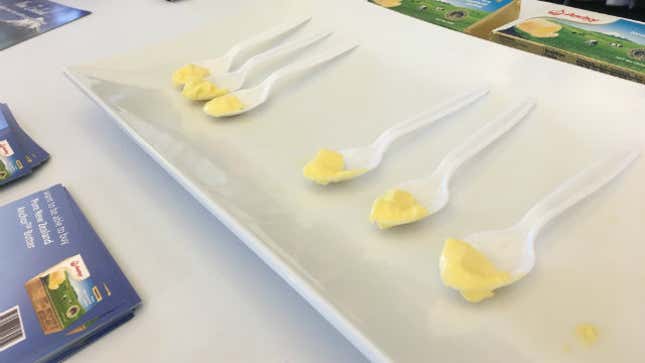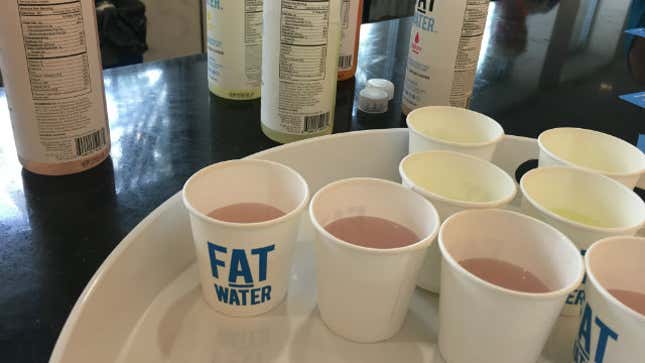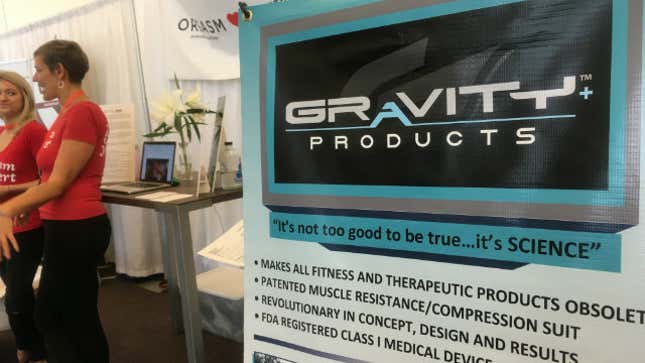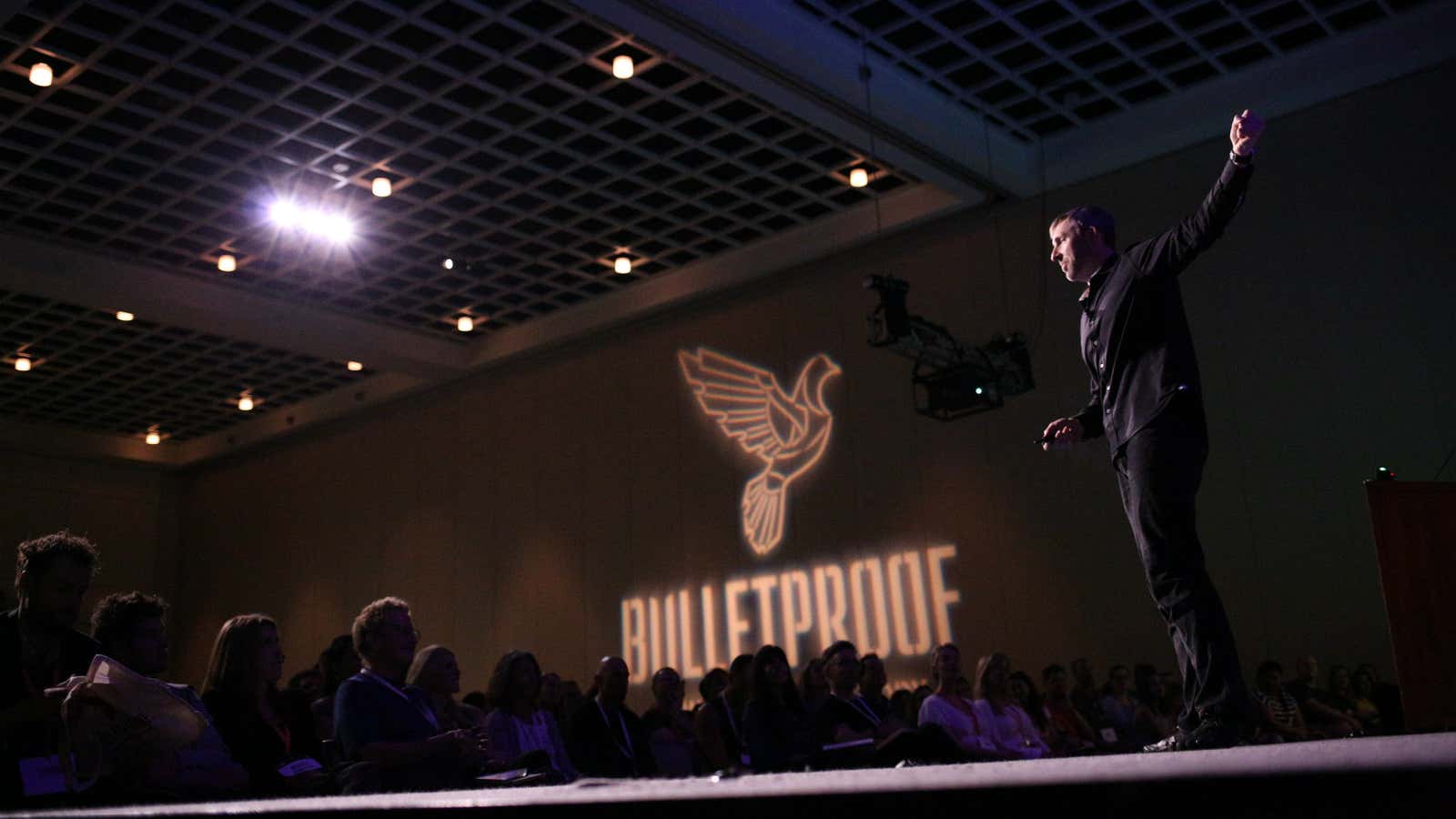It was not even 8am when I saw a man planking in a corner of the Pasadena Convention Center. He was off in a corner by himself, just getting a little core work done, in a trade hall replete with an oxygen bar, a hyperbaric chamber, and a table of free butter samples set out on plastic spoons.
From a curtained-off corner snaked a line of people waiting to pay $35 to $250 to have a substance described simply as “energy boost and gentle liver detoxification” injected into their veins. A vendor hawked jars of elk antler velvet and powdered cow colostrum.

This was the 3rd annual convention of Bulletproof, a diet, fitness and lifestyle brand that promises better living through a trademarked high-fat diet, mental and physical performance enhancers, and copious amounts of its signature blend of coffee, butter and oil.
Since launching as a blog in 2011, Bulletproof has attracted a legion of devoted followers who say its tips helped them lose weight, improve concentration, and perform better.
While other brands that sell dietary supplements and workout equipment call themselves fitness or lifestyle companies, Bulletproof says it’s in the business of biohacking. In company lingo, “being Bulletproof” means hacking your diet, your sleep, your workout routines and virtually every other interaction with your environment to become a smarter, sharper, better performing you.
But Bulletproof’s slick message looks remarkably like a repackaged version of the one self-improvement gurus from Oprah Winfrey to Mehmet Oz to Andrew Weil have been peddling effectively for some time now: pay attention to what you eat. Meditate. Make time to reflect on the things you’re grateful for. The difference is that it’s dressed in the rational white coat of science instead of the fuzzy language of self-esteem.
What Bulletproof is really selling isn’t high-fat coffee but a new take on a perennially popular product: the promise of a better life, and a faster, easier way to get there.
Better living through fat
The Bulletproof diet has a lot in common with the paleo diet and other high-fat, low-carb eating plans that have gained popularity in recent years. Advocates point to evidence that boosting protein and fat intake at the expense of carbohydrates improves long-term weight loss and heart health.
Fat accounts for 50% to 60% of Bulletproof’s recommended daily caloric intake. Protein makes up another 20%. When asked about seemingly contrary evidence, like the World Health Organization study linking red meat and cancer, founder and CEO Dave Asprey is quick to point out that he advocates consumption of “healthy fats” from grass-fed animals and other high-quality sources, not the low-grade stuff found in a typical US diet.
Asprey, a tech entrepreneur with no science or medical training, ”masterminds” development of all Bulletproof products with an in-house team of doctors, nutritionists, and biochemists, a Bulletproof spokesperson said. Asprey is 43. He takes 100 to 125 dietary supplements and “cognitive-enhancing substances” each day.
“I’m going to live to be 180. At least 180,” Asprey told Quartz. “And I don’t mean to sound crazy, and I don’t think I’m crazy.”
The company’s website promises adherents weight loss “with zero hunger and zero cravings ever.” It’s an enticing offer. The only issue is that there is no such thing as a dietary magic bullet. Not even Bulletproof’s.
A diet’s effectiveness depends largely on the person eating it and the goal they want to achieve, said Christopher Gardner, a professor at Stanford University’s medical school who focuses on nutrition. No single eating plan delivers weight loss for all.
“I can’t refute him,” Gardner said of Asprey. “All the stuff he might be looking at is plausible. The key word there is ‘plausible.’ But I can guarantee you that on any issue he’s got there, I could find a plausible research paper that points in the other direction.”
“It just seems true”
In addition to its cookbooks, coffee and supplements, Bulletproof offers an expanding array of branded and affiliated products claiming to advance the goal of better performance. Some strain the limits of credibility: fat-infused water, a $1,500 vibrating plate that claims to detoxify the immune system and boost brain function, a spray that spreads “good bacteria” around the home.

It has also started certifying Bulletproof coaches, offering a nine-month, $3,997 course, from which graduates will emerge with a wealth of “innovative, science-based information” they can impart to their own fee-paying clients.
The Bulletproof path just works, person after person told me in Pasadena. It speaks to people disappointed by the limits of traditional healthcare and conventional diets. It’s empowering, the idea of finding shortcuts around one’s own biology.
“You know, it just seems true. It’s true because it’s based on knowledge,” said Sadie Scott, a self-professed biohacker from Scotland in line for an injection. “It’s not about being right or wrong. It’s about experimenting with what works.”
And a lot of people are willing to experiment. The Bulletproof podcast gets 1.2 million downloads per month. The first Bulletproof Coffee Shop opened this summer in Santa Monica, California.
In July, Bulletproof announced that it raised $9 million from the VC firm Trinity Ventures, an early investor in Starbucks and Jamba Juice. (Asprey was an entrepreneur-in-residence at Trinity in 2010.) It’s not releasing revenue figures.
Like Oprah, for guys
Bulletproof’s marketing is particularly adept at reaching younger men, an audience that hasn’t been receptive to the message of self-care and healthy living.
“I started listening to Dave on the podcast. That was about 60 lbs. heavier than I am now,” conference goer Jeremy Fair said as the auditorium filled for Asprey’s keynote speech. “I thought to myself, I’ve never heard something so far out.”

Fair drank the coffee. He cut out gluten. He cut out non-grass-fed meats. He ate vegetables, something that hadn’t passed his lips in years. Obviously Asprey’s wasn’t the only pro-vegetable voice out there. But his was packaged the way a 30-something guy needed to hear it.
“I used to be a three-beer-a-day guy,” Fair added. “Now I don’t drink.”
At this, his seat mate sat up and offered a fist bump, in a way that seemed more supportive than bro-ey. Samir Malik had quit drinking too. Going Bulletproof forced Malik to pay attention to his diet, his health, and an interior world he’d never allowed himself to access.
“I started tapping into these feelings and emotions I’d never tapped into,” he said. He’s now a manager at the Bulletproof Coffee Shop in Santa Monica, and an emotions coach.
Studies have made clear for years that one of the most effective ways to make a consistent change like losing weight is to surround yourself with like-minded people. Maybe the biggest benefit of a brand like Bulletproof is that it creates a gathering point, a way for people to connect with others over the low-tech goal of becoming a better person.
As for the monitors and the supplements and the endless products, Asprey offers a surprising take: you don’t really need them.
“There’s really only three things that you need: Gratitude. Forgiveness. Awareness,” Asprey told me. “If you have those things you can turn on happiness. You can turn down stress. The problem is that achieving those states is really a lot of work. It takes a lot of time. It’s difficult. You can come at this the old fashioned way, but it’s going to take a lot longer.”
